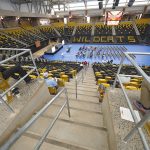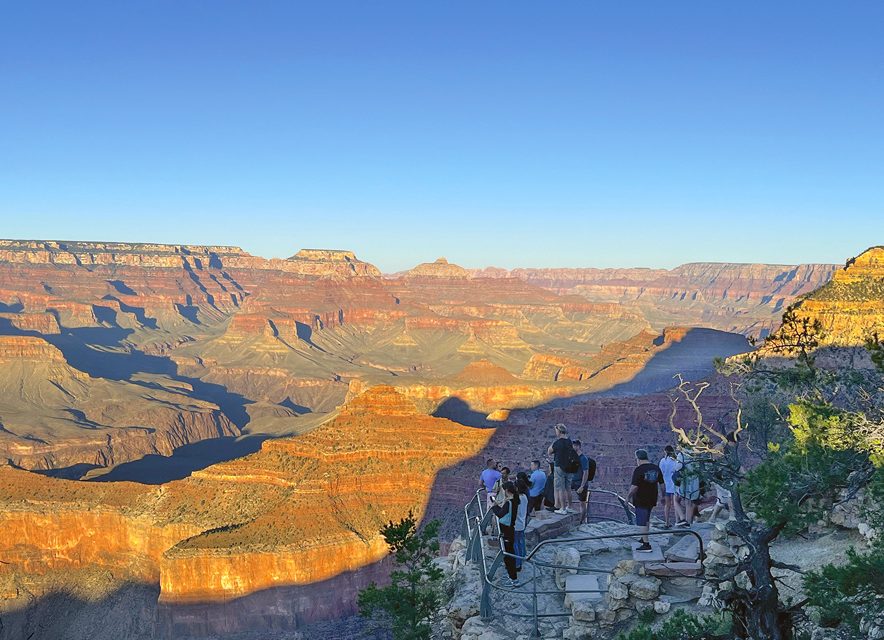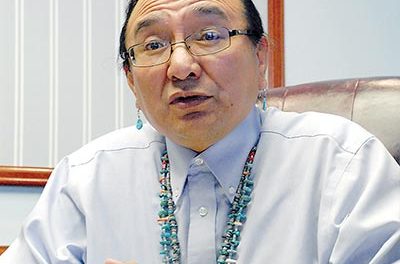
FERC denies permit for Big Canyon project

Navajo Times | Kianna Joe
At the Yavapai Observation area, tourists take advantage of the shade to see the contrasts of colors in the Grand Canyon.
WINDOW ROCK – The Federal Energy Regulatory Commission has denied Pumped Hydro Storage LLC preliminary permits to dam Big Canyon. This decision was rendered on April 25, after pending – since 2020 – for four years.
Big Canyon is a contributing canyon off the Little Colorado River where water above flows into the Colorado River, inside the Grand Canyon National Park.
Big Canyon Project
According to court documents, the Pumped Hydro project would have been located entirely on the Navajo Nation in Coconino County, Arizona.
The request for the permit was filed on March 12, 2020. The project wanted to pump billions of gallons of groundwater to produce hydroelectric power, notwithstanding the opposition from tribes like the Navajo Nation, whose land the project had been proposed.
According to court documents, FERC had to omit the “Navajo Nation” from the project name, which was previously submitted as “Navajo Nation Big Canyon Storage Project.”
“We (FERC) note that the proposed project is not in any way affiliated with the Navajo Nation and that the Navajo Nation has had no role in Pumped Hydro’s pursuit of the project,” states the court document.
In February, FERC denied seven other pumped storage hydropower projects on the Navajo Nation and would not approve permits for projects on tribal lands when the tribe opposes them.
Because of FERC’s new policy that the commission will not issue preliminary permits for projects proposing to operate on tribal land, individuals and organizations can oppose it. In this case, the Coppermine Chapter filed comments opposing the project, with additional comments from the Navajo Nation.
After the Navajo Nation reiterated its concerns about the project, Pumped Hydro still filed comments requesting FERC not to apply the new permit policy to its proposed Big Canyon project because the application was filed in 2020, several years before the new policy took effect, court documents state.
Discussion
The Federal Energy Regulatory Commission recognizes the unique relationship between the U.S. and Native American tribes and assures that tribal concerns and interests are considered.
The court document states that FERC’s actions or decisions have the potential to adversely affect Native tribes or Indian trust resources. FERC reviewed the application and denied permits because of its trust responsibility to the tribes.
However, Pumped Hydro argues that the new preliminary permits policy “should not apply to the Big Canyon Project” and stated gaining tribal approval is difficult at the permit stage and that the “issuance of a preliminary permit allows for more resources to begin consultation with the Navajo Nation.”
However, the FERC stated that Pumped Hydro’s arguments do not persuade it. It is applying the new permit policy to all pending and new permit applications and has already applied it to applications filed years before the established new policy.
FERC recommends “to avoid permit denials.” The court document states that potential applicants should work directly with tribal stakeholders before filing applications to ensure that tribes are fully informed about proposed projects on their lands and whether they’re willing to consider them.
“The Navajo Nation opposed the application, raising numerous issues, including that Pumped Hydro has not sought the consent of the Nation, local community, or individuals with customary use rights for the use of the lands, and that the proposed project may adversely impact the Nation and its members’ use of the lands,” the court document states.
The Navajo Nation contends that the project may impact its water rights to and use of the Little Colorado River and notes that the water is subject to ongoing adjudication.
The Nation also emphasized that the LCR and surrounding features hold significant cultural and historical value.
The Pumped Hydro project has caused concerns to several tribes, including the Navajo Nation, the Havasupai Tribe, the Hopi Tribe, the Hualapai Tribe, the Kaibab Band of Paiute Indians, the Las Vegas Tribe of Paiute Indians, the Moapa Band of Paiute Indians, the Paiute Indian Tribe of Utah, the San Juan Southern Paiute Tribe, the Yavapai-Apache Nation, and the Pueblo of Zuni. These tribes all noted historical and cultural ties to the proposed project area.







 Highway 264,
Highway 264, I-40, WB @ Winslow
I-40, WB @ Winslow